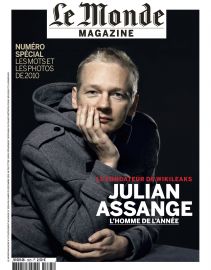
This is the first of a series of posts by Daniel Dayan exploring the significance of WikiLeaks.
Is WikiLeaks a form of spying? Transferring information to an alien power can induce harm. This is why spying constitutes a crime. In the case of WikiLeaks, the transfer concerns hundreds thousands of documents. The recipients include hundreds of countries, some of which are openly hostile. In a way WikiLeaks is a gigantic spying operation with a gigantic number of potential users. Yet, is it really “spying?”
Spying (in its classical form ) involves a specific sponsor in need of specific information to be used for a specific purpose, and obtained from an invisible provider. WikiLeaks “spies” eagerly seek to be identified (Julian Assange, WikiLeaks founder and editor in chief, has been voted Le Monde’s “man of the year”). Information covers every possible domain, and there is no privileged recipient. Anyone qualifies as a potential beneficiary of Wiki-largesses and most of those who gain access to the leaked information have no use for it. Spying has become a stage performance.
On 9/11 a group of Latin American architects hailed the destruction of The Twin Towers as a sublime event. The pleasure of seeing Rome burning had been made available for the man of the street. It was –suggested the builders – a democratization of Neronism. In a way, WikiLeaks, could also be described as a democratization of spying. It offers a form of “public spying.” Distinct from mere spying (a pragmatic activity), it proposes “spying as a gesture.” This gesture concerns other gestures. What WikiLeaks discloses is less (already available) facts than the tone in which they are expressed.
Content or gestures? 
If the Assange leaks reveal nothing that we did not know already, what counts is less their propositional content than the enacted speech acts. The vocabulary of WikiLeaks gestures starts with the noble gestures of war. Many commentators tell the WikiLeaks saga in military terms. For the Umberto Eco, it is a“ blow:” “To think that a mere hacker could access the best kept secrets of the world’s most powerful states is in fact a considerable blow to the state department.” For David Brooks it is a declaration of war: “the group celebrated the release of internal State Department documents with a triumphalist statement claiming that the documents expose the corruption, hypocrisy and venality of U.S. diplomats.”
The journalism of investigation, the journalism of disclosure, and the journalism of intrusion
By inflicting enforced visibility, WikiLeaks adopts a family of gestures that characterize contemporary trends in journalism. In a way WikiLeaks is “investigative journalism” pushed one step further. Yet “investigative journalism” is a misnomer, since, in principle, every sort of journalism should involve investigation. If sources and facts were not checked, journalism would be no more than gossip or propaganda. The real name for what is usually called “the journalism of investigation” should be the “journalism of disclosure.” In a way, then, WikiLeaks “enforced visibility” is a new step in the journalism of disclosure.
Like a journalism of disclosure, it displays a paradoxical virtue. WikiLeaks can cause a scandal without revealing anything new. The journalism of disclosure, can astonishingly survive without disclosing anything at all. At that point it turns into a journalism of mere intrusion. “Intrusive journalism” may wish to become a journalism of investigation, a journalism of denunciation. Yet, the process fails because the offered revelation just doesn’t occur. What is left, is the trappings of denunciation; the denouncing gesture without an actual content.
Thus Michael Moore bursts into the building of a large corporation, finds no one to challenge, and harangues a closed door. Or, to take a French example, Sarkozy is being filmed, without knowing it while he awaits the beginning of an interview to be aired on channel FR 3. Sarkozy is waiting for his turn to get on the air; he exchanges small talk with people around him, muses about new subjects for TV shows. The video is mildly boring. Apart from its intrusive nature (and the dogma of Sarkozy’s detestability), it reveals nothing of interest. All it has to offer is the gesture of filming someone who is not aware of being filmed. Yet the video turns into a trophy circulating on websites. It reveals nothing about Sarkozy, but says a lot about the use of visibility, about a new form of “surveillance” that denies the president the right to a “back region.” All it really displays is its own intrusive nature. What is mostly interesting about this example of “intrusive journalism,” is that it is has provoked heated controversies, and turned the cameraman who recorded the non-event into a hero. Like Assange, this hero is a crusader for a new visibility ( which I plan to address in future posts), a “transparentizer.”
[…] that it is. We agree that the distinction between public and private has to be drawn. Thus Daniel (link, link) and I (link) fundamentally agree that WikiLeaks’ general release of secret diplomatic […]
[…] on the importance of making a strong distinction between public and private. Thus, for example, he and I were both highly critical in Deliberately Considered posts of the WikiLeaks dump, as was […]
French Baguette Recipe…
[…]here are some links to sites that we link to because we think they are worth visiting[…]…